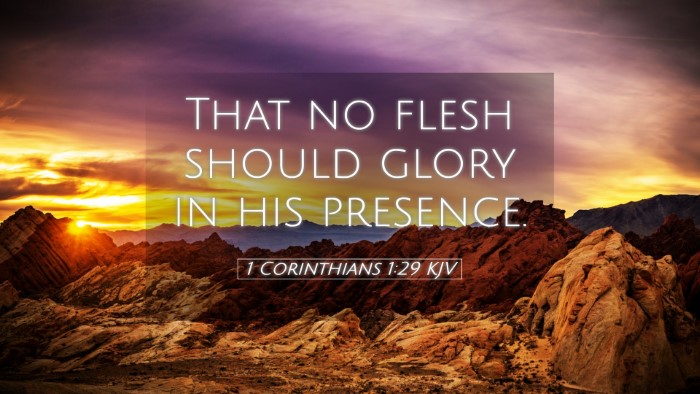Commentary on 1 Corinthians 1:29
Verse: 1 Corinthians 1:29 - "That no flesh should glory in his presence."
Introduction
The Apostle Paul, in his first epistle to the Corinthians, addresses a church divided by factions and allegiances, reminding them of the foundational truth of their faith. In 1 Corinthians 1:29, Paul emphasizes the reason for God's choice: to ensure that no one can boast in their own wisdom or strength before Him. This verse encapsulates a central theme in Pauline theology: the humility of believers in light of God's grace.
The Context of Paul’s Argument
To fully grasp the significance of 1 Corinthians 1:29, we must consider its context. Paul has been discussing the wisdom of God in contrast to the wisdom of the world (1 Corinthians 1:18-25). The Corinthians, influenced by their cultural context, placed high value on human wisdom and oratory. Paul seeks to counter this by highlighting God's sovereign choice and the foolishness of the Gospel as a source of salvation.
Matthew Henry's Commentary
Matthew Henry illuminates this verse by drawing attention to the radical nature of God’s selection. He states that no one should be able to stand in God's presence and claim merit. Paul’s emphasis on the absence of human glory underscores the depth of God’s grace. Henry also notes that the purpose of this divine initiative is to ensure the glory of God remains uncontested and unshared, highlighting the idea that salvation is entirely a work of God.
Albert Barnes' Insights
Albert Barnes provides a practical understanding of this verse. He notes that it serves as a reminder of the inherent weakness of human strength. In any discussion regarding the reasons for divine choice, Barnes emphasizes that believers should recognize their limitations and the grace bestowed upon them. He argues that this verse encapsulates the Gospel message—that it is through acknowledgment of one’s weakness that one embraces the strength found in Christ.
Adam Clarke's Interpretation
Adam Clarke offers insights into the phrase "no flesh should glory." He comments on the universality of this statement, indicating that it applies to all humanity. Clarke posits that God's selection and calling are meant to crush any notion of pride. In his view, the wonder of salvation lies in its accessibility to the meek and humble rather than the proud and powerful. He provides examples from Scripture showing God’s consistent pattern of choosing the weak to confound the strong.
Theological Implications
This verse poses deep theological implications about the nature of salvation. It reinforces the doctrines of grace, election, and the insufficiency of human merit. It reminds believers that their identity is not rooted in personal accomplishments or status but solely in their relationship with Christ. This humility fosters a community where boasting is replaced by gratitude and worship.
Practical Applications for Believers
- Humility: Recognizing one's limitations leads to a deeper reliance on God's grace.
- Community: This understanding promotes unity as believers acknowledge that they have all received grace together.
- Witness: Acknowledging that salvation is by grace invites believers to share the Gospel with all, regardless of their social or intellectual standing.
Conclusion
1 Corinthians 1:29 serves as a powerful reminder of the sovereignty of God in the process of salvation. Paul’s declaration that "no flesh should glory in His presence" calls us to reflect on the nature of our faith, urging us towards humility and a deeper appreciation for the grace extended to us. As we internalize this truth, we are equipped to live out our faith in a manner that honors God above ourselves.


